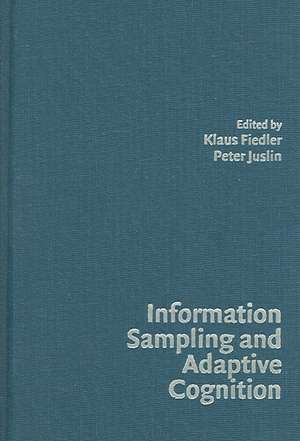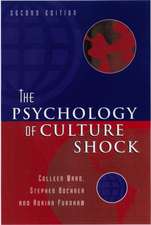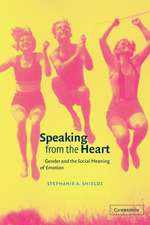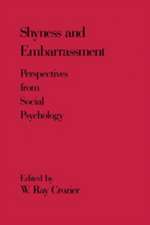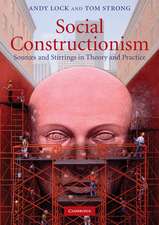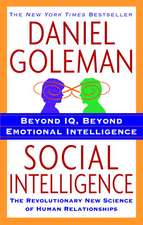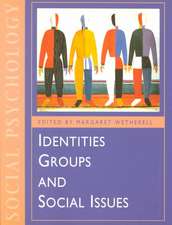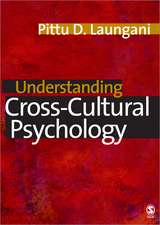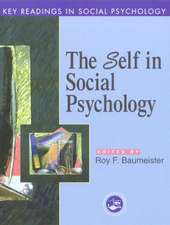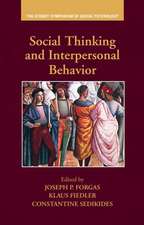Information Sampling and Adaptive Cognition
Editat de Klaus Fiedler, Peter Juslinen Limba Engleză Hardback – 18 dec 2005
| Toate formatele și edițiile | Preț | Express |
|---|---|---|
| Paperback (1) | 333.95 lei 6-8 săpt. | |
| Cambridge University Press – 4 dec 2005 | 333.95 lei 6-8 săpt. | |
| Hardback (1) | 519.62 lei 6-8 săpt. | |
| Cambridge University Press – 18 dec 2005 | 519.62 lei 6-8 săpt. |
Preț: 519.62 lei
Preț vechi: 583.84 lei
-11% Nou
Puncte Express: 779
Preț estimativ în valută:
99.46€ • 108.07$ • 83.60£
99.46€ • 108.07$ • 83.60£
Carte tipărită la comandă
Livrare economică 21 aprilie-05 mai
Preluare comenzi: 021 569.72.76
Specificații
ISBN-13: 9780521831598
ISBN-10: 0521831598
Pagini: 498
Ilustrații: 61 b/w illus. 38 tables
Dimensiuni: 152 x 229 x 32 mm
Greutate: 0.78 kg
Editura: Cambridge University Press
Colecția Cambridge University Press
Locul publicării:New York, United States
ISBN-10: 0521831598
Pagini: 498
Ilustrații: 61 b/w illus. 38 tables
Dimensiuni: 152 x 229 x 32 mm
Greutate: 0.78 kg
Editura: Cambridge University Press
Colecția Cambridge University Press
Locul publicării:New York, United States
Cuprins
Part I. Introduction: 1. Taking the interface between mind and environment seriously Klaus Fiedler and Peter Juslin; Part II. The Psychological Law of Large Number: 2. Good sampling, distorted views: the perception of variability Yakoov Kareev; 3. Intuitive judgments about sample size Peter Sedlmeier; 4. Risky prospects: when valued through a window of sampled experiences Ralph Hertwig, Greg Barron, Elke Weber and Ido Erev; 5. Less is more in contingency assessment - or is it? Peter Juslin, Klaus Fiedler and Nick Chater; Part III. Biased and Unbiased Judgments from Biased Samples: 6. Subjective validity judgments as an index of sensitivity to sampling bias Peter Freytag and Klaus Fiedler; 7. An analysis of structural availability biases and a brief study Robyn Dawes; 8. Subjective confidence and the sampling of knowledge Joshua Klayman, Jack Soll, Peter Juslin, and Anders Winman; 9. Contingency learning and biased group impressions Thorsten Meiser; 10. Mental mechanisms: speculations on human causal learning and reasoning Nick Chater and Mike Oaksford; Part IV. What Information Contents Are Sampled?: 11. What's in a sample? A manual for building cognitive theories Gerd Gigerenzer; 12. Assessing evidential support in an uncertain environment Chris M. White and Derek Koehler; 13. Information sampling in group decision making: sampling biases and their consequences Andreas Mojzisch and Stefan Schulz-Hardt; 14. Confidence in aggregation of opinions from multiple sources David Budescu, Adrian K. Rantilla, Tzur M. Kareliz and Hsiu Ting Yu; 15. Self as a sample Joachim Krueger, Melissa Acevedo and Jordan Robbins; Part V. Vicissitudes of Sampling in the Researcher's Mind and Method: 16. Which world should be represented in representative design? Ulrich Hoffrage and Ralph Hertwig; 17. 'I'm m/n confident that I'm correct': confidence in foresight and hindsight as a sampling probability Anders Winman and Peter Juslin; 18. Natural sampling of stimuli in (artificial) grammar learning Fenna Poletiek; 19. Is confidence in decisions related to feedback? Evidence - lack of evidence - from random samples of real-world behavior Robin Hogarth.
Descriere
This book proposes that environmental information samples are biased and cognitive processes are not.
